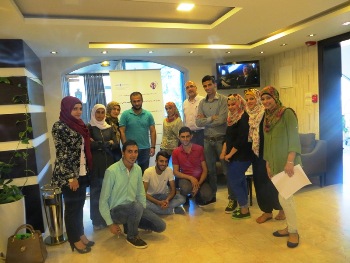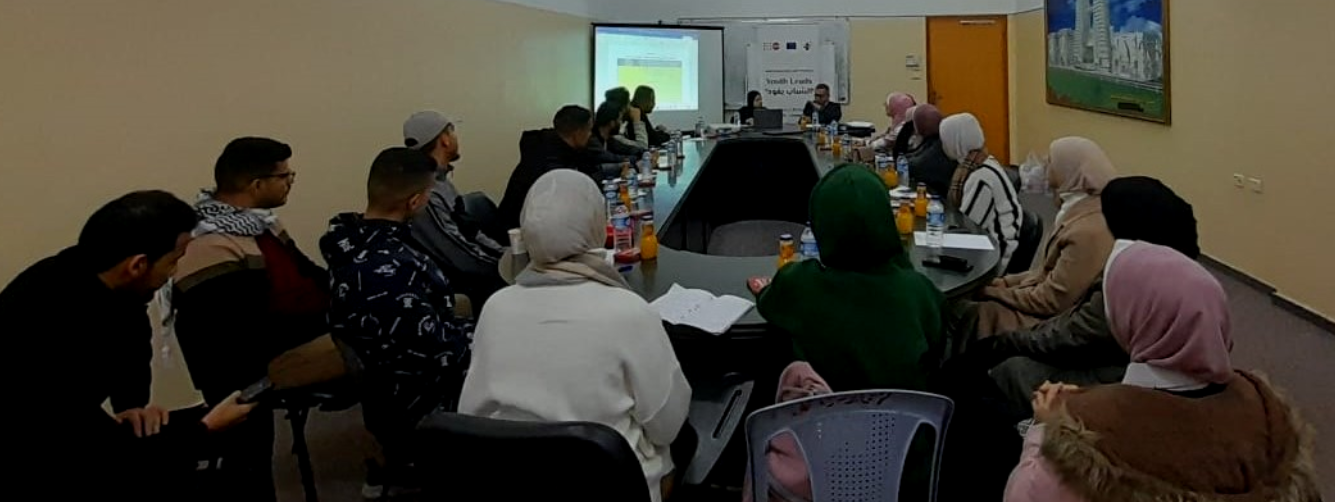
Ramallah – Youth activists who participated in a 22-member group of young men and women in a training workshop on the on media tools, mechanisms and media usage to tackle social issues with focus on means of investigative reporting, spoke of their experiences from the training and its impact.
Influence thought patterns
Ansaf Al Asi, a Birzeit University political science graduate said the training had an ‘active impact on the way I think about investigative reporting”. She said it broadened her ideas about article-writing and differentiating between journalistic and investigative work. “The training also helped on ways to analyze news and fact-check it before it is published or used.”
Added value on two levels: media and social accountability
Youth activist Abdallah Qadah said the training added knowledge at two levels: the first pertains to skills on how the media deals with social issues, while the second is about writing skills in the field of investigative reporting.
A tremendous step forward
Majdal Ladadwah from Birzeit University described the training workshop as a ‘tremendous step towards changing the status quo of today’s journalism, which she called ‘really unfortunate.”
She went on to say that one of the most important subjects discussed during the workshop was the problem of journalists trusting what they write. “I was shocked at the primitive way journalists write up their reports,” she said. “But the information we received has changed a lot of prevalent conceptions. Today we are more capable of using the media in many issues, whether social or otherwise. We now have a strong basis for investigative journalism which will allows us to shed light on many of our issues, making us more capable of exercising our role in holding others accountable in regards to our public affairs.”
Promoting the skills and capabilities of youth groups
The MIFTAH-organized training workshop is part of the organization’s efforts to promote the potentials and skills of youths in using the media in social accountability, specifically the use of investigative reporting. All of the participants expressed a desire for further training so they could be able to have more opportunities to learn about journalistic writing in general and investigative reporting in particular.
The responsibility of the media in prompting and achieving social accountability
Project coordinator Abeer Zaghari said the training workshop was part of the “Enhancing women access to security and social accountability in Palestine” project, which MIFTAH is implementing in 2015/2016 in partnership with UNDP/UN Women Joint Programme: Strengthening the Rule of Law; Justice and Security for the Palestinian People – SAWASYA.
Zaghari said 22 young activists from various areas of the West Bank participated in the training workshop, which focused on media usages linked to social accountability techniques to contribute in combatting corruption and promote women's rights to access to security. “The training was interactive; the first two days focused on an introduction to the responsibility of the media in promoting and achieving social accountability and to the role of the Palestinian media in this regard. Later, the participants were introduced to the fundamentals, methodology and criteria of investigative reporting so they could choose social issues from the Palestinian reality to shed light on through articles they have started drafting, that will later be published in the “Other Opinion – Rayi Akhar” edition issued by MIFTAH as a supplement to Al-Ayyam Daily Newspaper”, Zaghari explained. On the third day, she maintained, the articles written by the participants were reviewed along with the supervision of the trainer Montasser Hamdan and MIFTAH’s media coordinator Mohammad Abd Rabbo.
Empowerment and raising capacities
The training was aimed at introducing the Palestinian Political and Social Active Youth Network to multi-media tools used in social accountability and advocating for various social issues in order to promote the rule of law in Palestinian society and efforts to combat corruption, according to Zaghari. She said this would help to raise the capacity of Palestinian youth in the field of investigative journalism, which she maintained, the Palestinian society desperately need.
The training included activities such as brain-storming sessions, discussions, group work and exchange of opinions. Other activities included a discussion of the issues that needed to be addressed in the Palestinian society by using investigative reporting, advocacy and lobbing campaigns and the building of alliances, including with the media in preparing and publishing articles. Some of the subjects raised included: daycare centers in Palestine, the financial crises in universities, the security chaos and absence of justice in enforcing the law and the electricity crisis in Gaza.
As part of the follow-up with participants, a Facebook page was set up to allow communication between the youth group, the trainer and MIFTAH's media expert (Coach). Participants exchanged ideas and notes regarding their articles.
On the last day, a recap of the theoretical issues was conducted and the participants’ finalized written products were presented. As a follow up, an in-depth discussion took place on the suggested topics and drafting of relevant articles for publication in MIFTAH’s Ray Akhar edition by the end of 2015.
Evaluation and recommendations
In his evaluation of the training, trainer Muntaser Hamdan said the majority of the trainers were eager to learn and develop their abilities and skills in the field of accountability and journalism. Hamdan maintained that the participants still needed more specialized training workshops in journalism given their overall impression of the weakness of the local media and its impact on society.
Supporting youth cadres
MIFTAH program director for Participation Enhancement Program , Lamis Shuaibi said this kind of training was to ‘support and empower youth cadres so they could bring the issues of society to the fore.” She said it was an attempt to direct the energy of youth towards impacting public opinion on the vaguer and more unknown issues, through means such as information sharing or professional investigative reporting. It is also aimed at empowering youths to pose issues and hold decision-makers accountable for their responsibilities towards social justice.








